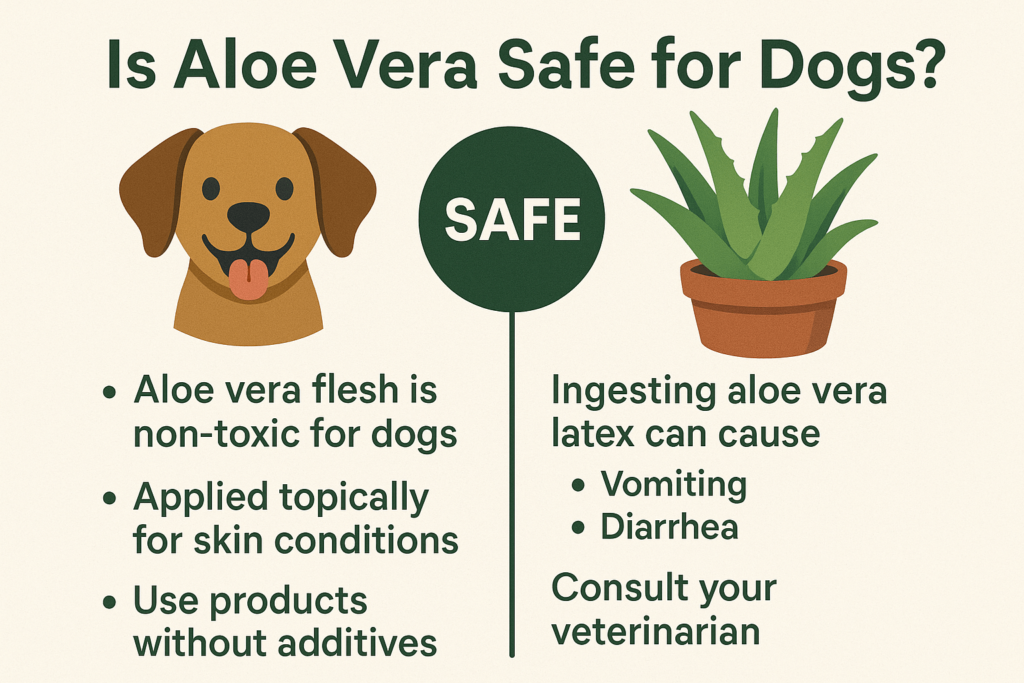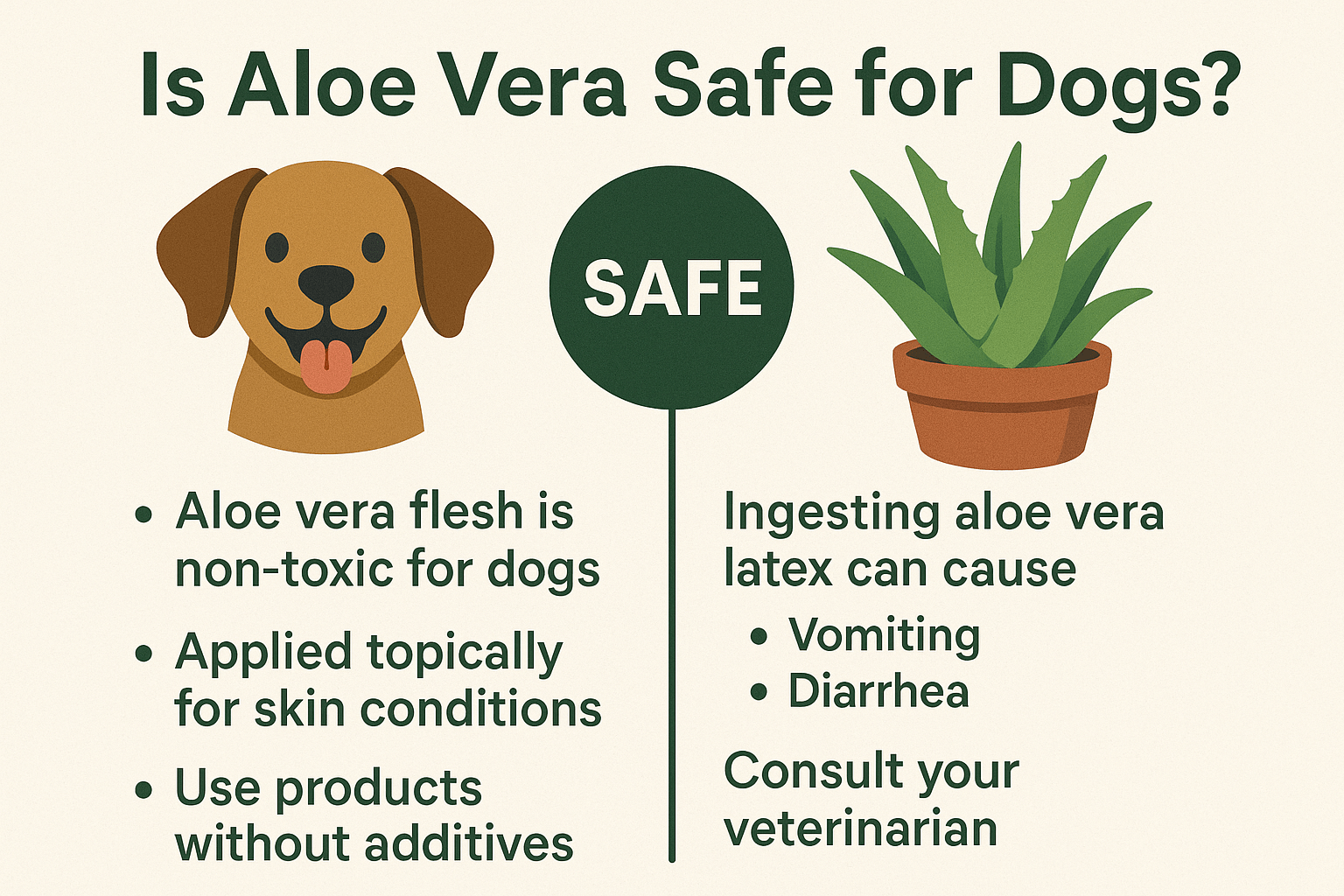Is Aloe Vera Safe for Dogs?
Aloe vera is widely celebrated for its soothing and healing properties, often used in skincare, health remedies, and even food supplements. But when it comes to our furry friends, the question arises: is aloe vera safe for dogs? While this plant offers numerous benefits for humans, its effects on pets are less straightforward. Certain compounds in aloe vera can be harmful to dogs if ingested or applied incorrectly. Understanding the risks and benefits is crucial for ensuring your dog’s safety while exploring natural remedies. Let’s dive into everything you need to know about using aloe vera responsibly around your canine companion.
Expert Insight on Aloe Vera
“Aloe vera is a cactus-like plant that has been historically used to treat various ailments, including burns, skin conditions, inflammatory bowel disease, and diabetes. Both oral and topical products are derived from the aloe vera plant.”
Potential Risks of Aloe Vera for Dogs
While aloe vera has many beneficial properties, it also contains compounds that can pose risks to dogs. Being aware of these dangers helps prevent accidental poisoning or adverse reactions.
Saponins Can Cause Toxicity:
Aloe vera contains saponins, which are toxic to dogs if ingested in large quantities. These compounds can lead to gastrointestinal upset and other symptoms.Laxative Effects from Anthraquinones:
The anthraquinones in aloe vera act as laxatives, potentially causing diarrhea or dehydration in dogs who consume it.Skin Irritation from Direct Contact:
Applying pure aloe vera gel directly to your dog’s skin may cause irritation, especially if they have sensitive or allergic reactions.Risk of Accidental Ingestion:
If your dog chews on an aloe vera plant, they could ingest harmful amounts of the sap, leading to toxicity.Symptoms of Aloe Vera Poisoning:
Signs include vomiting, diarrhea, lethargy, and loss of appetite. Immediate veterinary attention is necessary if these occur.
Understanding these risks ensures you take precautions before introducing aloe vera into your dog’s environment or care routine.

Safe Uses of Aloe Vera for Dogs
When used responsibly, aloe vera can offer some benefits for dogs. However, proper preparation and application are essential to avoid harm.
Topical Use Under Supervision:
Diluted aloe vera gel (free of additives) can soothe minor skin irritations like hot spots or insect bites when applied sparingly.Commercial Pet Products Containing Aloe:
Many pet-safe shampoos and ointments contain trace amounts of aloe vera, formulated specifically for canine use.Hydration Support in Small Doses:
In rare cases, veterinarians may recommend diluted aloe vera water to address mild dehydration—but only under professional guidance.Avoiding Oral Consumption:
Never give your dog aloe vera juice or supplements intended for humans, as they may contain harmful ingredients.Consult Your Veterinarian First:
Always seek advice from a vet before using any new product or remedy on your dog, including aloe vera-based treatments.
By following these guidelines, you can harness the potential benefits of aloe vera without compromising your dog’s health.
Check this guide 👉Is Peppermint Oil Safe for Dogs? Best 7 Expert Tips!
Check this guide 👉Is Tylenol Safe for Dogs? Best 7 Expert Tips!
Check this guide 👉Is Lemongrass Safe for Dogs? Best 7 Expert Tips!
Safe Practices with Aloe Vera | Unsafe Practices to Avoid |
|---|---|
Use diluted aloe vera gel for topical use | Apply undiluted aloe vera directly to skin |
Choose pet-safe products with aloe | Give human-grade aloe vera supplements |
Supervise all applications closely | Allow dogs to chew on aloe vera plants |
Consult a vet before trying anything new | Ignore signs of toxicity or irritation |
Monitor for allergic reactions | Overuse aloe vera in any form |
Signs Your Dog May Have Ingested Aloe Vera
If your dog accidentally consumes aloe vera, recognizing the symptoms early can save time and prevent complications. Here’s what to watch for:
Gastrointestinal Distress:
Vomiting and diarrhea are common signs of aloe vera ingestion due to its laxative properties.Lethargy and Weakness:
Dogs may appear unusually tired or uninterested in activities after consuming toxic substances.Loss of Appetite:
A sudden refusal to eat can indicate discomfort or illness caused by aloe vera poisoning.Dehydration Symptoms:
Excessive drooling, sunken eyes, or dry gums may signal dehydration resulting from diarrhea or vomiting.Behavioral Changes:
Restlessness, pacing, or whining may suggest your dog is experiencing pain or discomfort.
Act quickly if you notice these signs, as prompt veterinary care can make all the difference in your dog’s recovery.
Preventing Aloe Vera Exposure in Your Home
Keeping your dog safe from aloe vera starts with proactive measures to minimize exposure. Follow these tips to create a pet-friendly environment.
Keep Plants Out of Reach:
Place aloe vera plants on high shelves or in areas inaccessible to curious paws.Use Pet-Safe Alternatives:
Opt for non-toxic plants and remedies specifically designed for pets instead of relying on aloe vera.Store Products Securely:
Keep aloe vera gels, juices, and supplements locked away in cabinets or drawers.Educate Family Members:
Ensure everyone in your household understands the risks of aloe vera and knows not to share it with your dog.Supervise Outdoor Playtime:
If you grow aloe vera outdoors, monitor your dog during playtime to prevent them from chewing on the leaves.
Taking these steps reduces the likelihood of accidental exposure and keeps your dog safe from harm.
Benefits of Natural Remedies for Dogs
Natural remedies can provide gentle alternatives to traditional medications, but not all are suitable for dogs. Understanding their benefits—and limitations—is key to responsible usage.
Reduced Chemical Exposure:
Natural remedies often contain fewer synthetic chemicals, making them gentler on sensitive systems.Support for Minor Ailments:
Remedies like chamomile or calendula can soothe minor skin issues without harsh side effects.Holistic Approach to Health:
Many pet owners prefer holistic methods that address both symptoms and underlying causes of ailments.Improved Digestive Health:
Probiotics and digestive enzymes derived from natural sources can aid gut health in dogs.Growing Popularity Among Owners:
More pet parents are turning to natural options, though research and vet approval remain critical.
Natural remedies can complement conventional care, but safety should always come first.
Common Household Plants Toxic to Dogs
Beyond aloe vera, several common houseplants can harm your dog if ingested. Familiarizing yourself with these plants helps keep your pet safe.
Lilies:
Highly toxic to dogs, lilies can cause kidney failure if consumed.Philodendrons:
These popular plants contain calcium oxalate crystals, which irritate the mouth and throat.Pothos:
Similar to philodendrons, pothos can lead to oral swelling and difficulty swallowing.Sago Palm:
All parts of this plant are poisonous, causing liver damage and other severe symptoms.Dieffenbachia:
Known as “dumb cane,” this plant can cause intense burning sensations in the mouth and throat.
Identifying and removing toxic plants from your home creates a safer space for your dog to explore.
How to Introduce New Substances Safely
Introducing new substances, whether natural or synthetic, requires a cautious approach to avoid adverse reactions in your dog.
Start with Small Amounts:
Test any new product or remedy on a small area or in tiny doses to observe your dog’s reaction.Monitor for Allergic Reactions:
Watch for signs like itching, swelling, or respiratory distress, which indicate an allergic response.Keep Records of Ingredients:
Maintain a list of ingredients in case you need to report them to your vet during emergencies.Gradually Increase Usage:
If no adverse reactions occur, slowly increase the amount or frequency of use over time.Seek Professional Guidance:
Always involve your veterinarian in decisions about new substances to ensure compatibility with your dog’s health needs.
By taking these steps, you can introduce new elements into your dog’s routine safely and confidently.
Frequently Asked Questions About Aloe Vera and Dogs
Can I put aloe vera on my dog’s skin?
Yes, but only diluted and pet-safe versions should be used, and always under supervision.
What happens if my dog eats aloe vera?
Ingesting aloe vera can cause vomiting, diarrhea, and lethargy. Contact your vet immediately.
Are there dog-safe alternatives to aloe vera?
Yes, products like coconut oil or oatmeal-based creams are safer options for soothing skin irritations.
How do I know if a product contains safe levels of aloe?
Look for items labeled “pet-safe” and consult your veterinarian before use.
Can puppies tolerate aloe vera better than adult dogs?
No, puppies are more vulnerable to toxins and should never be exposed to aloe vera.
Prioritizing Your Dog’s Safety Around Aloe Vera
While aloe vera offers impressive benefits for humans, its use around dogs requires caution and careful consideration. By understanding the potential risks, safe applications, and preventive measures, you can protect your furry friend from harm while still exploring natural solutions for their needs. Always prioritize consultation with your veterinarian before introducing any new substance into your dog’s routine. With knowledge and vigilance, you can ensure your pet remains happy, healthy, and safe—even in households where aloe vera is present.
Do Cats Have Taste Buds? Best 7 Expert Tips! – Discover how cats experience flavors and why their taste is so unique.
Do Dogs Have Taste Buds? Best 7 Expert Tips! – Discover how dogs experience taste, their preferences, and what it means for their diet and health.
Can Cats Taste Sweet? Best 7 Expert Tips! – Discover why cats can’t taste sweetness, how it affects their diet, and tips to keep them healthy and happy.
Can Dogs Taste Sweet? Best 7 Expert Tips! – Discover how dogs perceive sweetness, which foods are safe, and tips to manage their sweet cravings responsibly.





